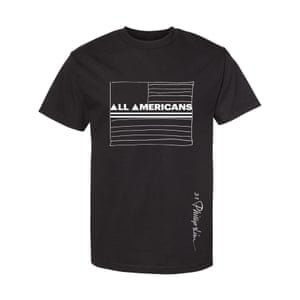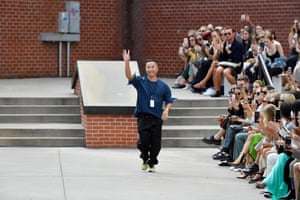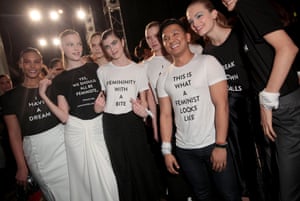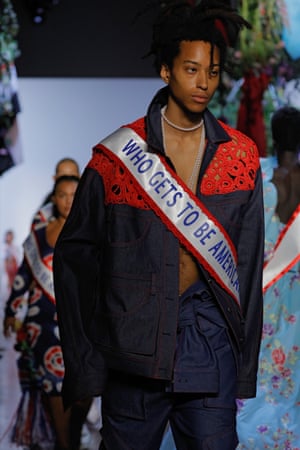Visits: 70
Since the Covid-19 pandemic began, an anti-Asian sentiment has been on the rise – and now the fashion community is putting itself at the forefront in tackling the hate. In the UK, racist incidents have rocketed and hate crimes have increased by 21%, while in the US, there has been an increase in racially motivated attacks against Asian Americans.
“The upturn of violence and discrimination really hit way too close to home for all of us,” says the US designer Phillip Lim. “When we see people who look like us, our friends and family members, colleagues being attacked, we can’t be silent.”

Phillip Lim’s T-shirt for the All Americans Movement
Lim’s 3.1 Phillip Lim label and Prabal Gurung are among the fashion brands contributing clothing, including t-shirts and hats, with proceeds going to the All Americans Movement, a campaign to help those from marginalised communities who have been affected by Covid-19.

Phillip Lim walks the runway at the 3.1 Phillip Lim Ready to Wear Spring/Summer 2020 fashion show. Photograph: Victor Virgile/Gamma-Rapho via Getty Images
“It’s a cross-cultural movement, which reinforces the idea that there are many different ways to be American,” says Gurung, the Nepalese-American fashion designer who is based in New York. “It is an idea: a confluence of different cultures, communities and dreams. When different minority groups stand up and stand together, there is an astounding level of support that can change the tides for a more equitable and peaceful future.”
It is a potent message, in the climate of racially based Covid incidents and Donald Trump labelling the pandemic the “Chinese virus”. “Assigning a race to this virus is exactly the type of misinformation we have to fight against to ensure we are well informed,” says Gurung. Lim agrees that the incendiary language around Covid is having a toxic effect. “It is frustrating to watch the leaders of this country blatantly gaslight the American public with this type of xenophobic rhetoric,” he says.
“I genuinely believe that most people want to do good,” says Gurung. “That said, I was not surprised by the racism. While I see the incredible beauty of this country, I have always been aware of the cracks in its foundation and the systemic racism that pulses under the surface.”

Prabal Gurung with models backstage wearing the slogan T-shirts from his AW17 show Photograph: Kelly Taub/WWD/Rex/Shutterstock
Gurung has been political in his work before. He sent models down the runway with statement T-shirts featuring slogans such as “The future is female” and “Our bodies, our choices, our power” and “I am an immigrant”. He stopped his 10th anniversary New York fashion week show being held at Hudson Yards when he found out that the owner hosted a Trump fundraiser. Provocatively, in the era of Trump’s immigration ban, his Spring/Summer 20 show featured a diverse cast of models wearing prom-like sashes asking: “Who gets to be American?”.
He said the idea for the collection came to him while he was in a business meeting. “I was sitting across from a group of businessmen, telling them about my goal to redefine the Americana aesthetic, and one of them said: ‘You don’t look American, so how can you define what America is?’” He said this exchange, along with Time magazine’s Who Gets To Be American cover, set off the central idea for the collection.

A model in a Who Gets To Be American sash from Prabal Gurung SS20 collection. Photograph: Randy Brooke/WireImage
“The sashes were a powerful visual moment, with all these diverse models from all over the world representing the different possible identities and stories of living the American dream,” he says, adding that the collection was about “questioning who gets to claim that identity in today’s climate”.
This political moment in fashion also marks a generational shift. “In Asian culture, our parents tell us to keep our heads down,” says Lim. “Don’t make problems and ignore racism so that it will just go away; it’s so ingrained in our subconscious as a means of survival. In our current situation, that mentality has the opposite effect. Being quiet strips away your right for a voice and it takes away the opportunity to be seen.”

